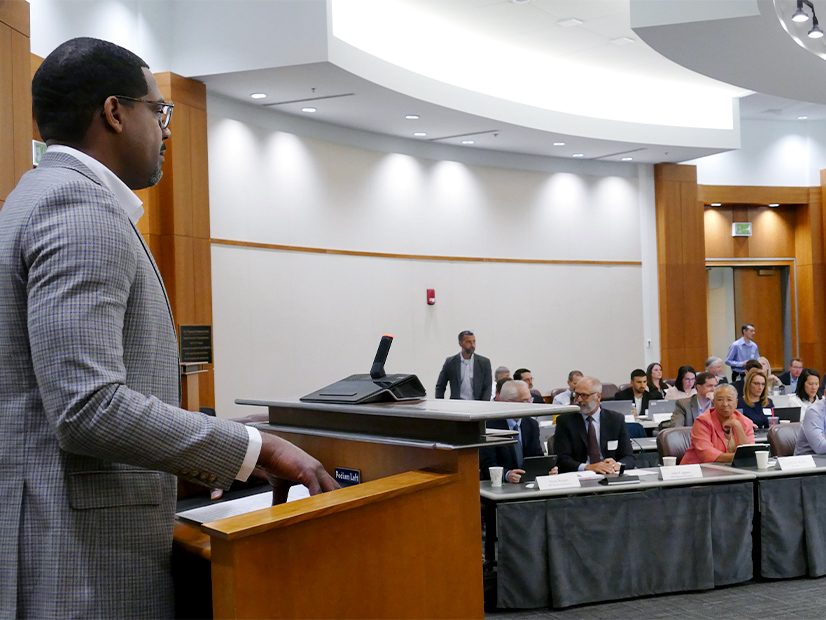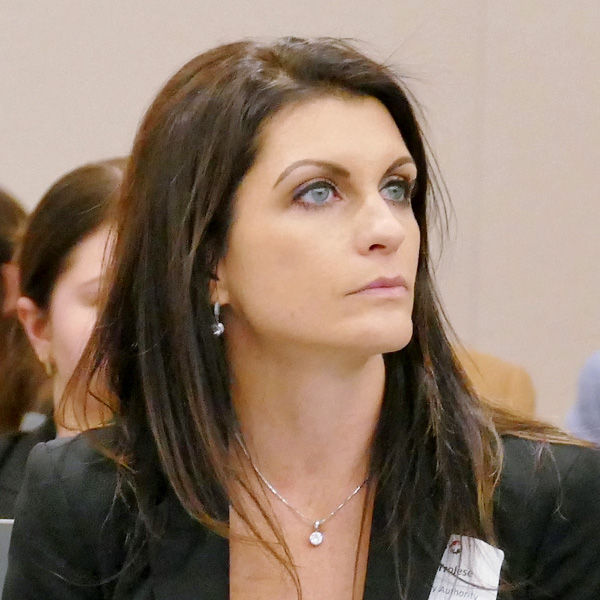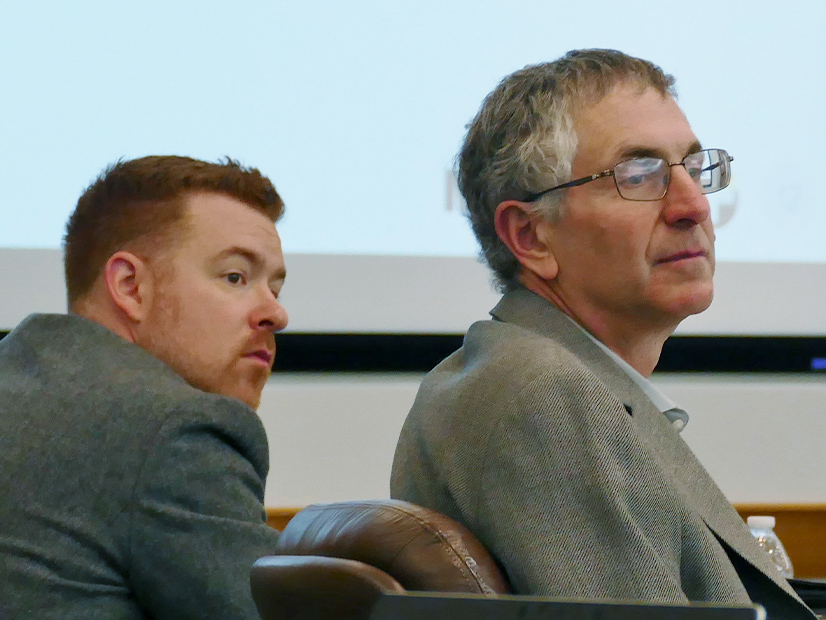
WESTMINSTER, Colo. — SPP Markets+ stakeholders last week kicked off the development phase of the grid operator’s proposed “RTO-light” service offering in the West, heating up the race with CAISO to create a regional market.
Meeting for the first time, the Markets+ Participants Executive Committee (MPEC), comprised of potential participants and stakeholders that have financially committed to drafting the market protocols, tariff and governing documents, agreed to accelerate the timeline to file the tariff at FERC.
MPEC now plans to make the filing by December or early next year. CAISO plans to file a tariff for its competing Extended Day-ahead Market (EDAM) before the year is up.
 Laura Trolese, The Energy Authority | © RTO Insider LLC
Laura Trolese, The Energy Authority | © RTO Insider LLCThe Energy Authority’s Laura Trolese, the MPEC’s newly elected chair, said speed is of the essence because some Western entities need to decide between the two markets within a year.
“They need an alternative to evaluate against in order to be able to make that decision,” she told RTO Insider. “While it may seem that we’re racing through this, we have been working on developing a market now for years, and we’ve had these same discussions. Yes, there are some new things, but we’ve had the same discussions and been working on putting a market together for four years together with some of the same faces in these previous efforts, some of the same faces that have been working through the EDAM process.
“We have a lot to draw from and to work from. It’s not starting from scratch and reinventing the wheel,” Trolese said.
The decision was just one of many stakeholders made during the two-day meeting. The MPEC also:
- approved extending the participant funding agreement deadline to May 1, allowing as many as four interested parties to formally commit to Markets+’s development;
- endorsed the first development phase’s scope of activities, tasks and deliverables;
- agreed with SPP staff’s proposal to allow entities to begin participating in Markets+ once FERC approves the tariff next year, even though some day-ahead functions may be unavailable; and
- approved stakeholder group charters, leadership and rosters.
The MPEC will oversee four working groups (design, seams, transmission, and operations and reliability) and five task forces that are expected to meet on a three-week cadence. Committee members amended their charters to allow the MPEC to reevaluate membership and voting once new funding agreements are executed.
The committee will meet in-person on a quarterly basis, with briefings to occur virtually as needed. The three-person Interim Markets+ Independent Panel (IMIP) provides final decision-making authority and a link to SPP’s Board of Directors. The panel, all SPP directors, plans to hold its meetings after the MPEC’s.
“The stakeholder process and the governance process that this group is engaged in is an ideal fit for the Western mindset,” said IMIP member John Cupparo, a Colorado native who professes a “don’t-fence-me-in” mindset. “It’s both challenging and rewarding. It will be some ups and downs along the way, but in the end, I think we’re getting a great product.”

“For those of you who haven’t seen it, it’s really an interesting process,” Eric Blank, chair of both the Colorado Public Utilities Commission and the Markets+ State Committee, told his committee Friday. “I really encourage you to watch, even independent of the substance. RTOS in the East that are staff-driven. This is really stakeholder-driven, and people just vote. It’s really unique.”
It’s that stakeholder-driven culture that SPP hopes will be the difference for Markets+.
“I’ve spent an awful lot of time in rooms like this talking about market evolution in the West … but I do believe that this is one that really is going to succeed,” said IMIP Chair Steve Wright, who previously has headed both the Bonneville Power Administration and Chelan (Washington) Public Utility District.
He pointed to the SPP-administered Western Resource Adequacy Program, the West’s first regional reliability planning and compliance program, as laying a “great foundation” in the West.
“Now we’re in a place where we actually had something that really works and we can build even more from that. This governance model, as applied to the West, can produce a market design for the West and by the West. SPP’s role here is not to make the decisions. Our role here is to facilitate and assist you in coming up with a market design that you want.”
The IMIP’s first voting item Wednesday was to approve the MPEC’s endorsement of a change to its voting structure that gives the independent sector a greater voice.
‘Frankensteining’ the Markets+ Tariff
The Markets+ Design Working Group will do much of the heavy lifting over the next few months, working with SPP staff to draft the tariff that will eventually be filed at FERC.
Staff said they have already “Frankensteined” together the best elements of markets previously approved by FERC into boilerplate language. Stakeholder groups will rework the basic tariff language to better fit Markets+’s unique design, with the MDWG reviewing their work.
“I can’t wait for the first ‘Mad Wag’!” SPP’s Chris Nolen said, sounding out the working group’s acronym.
“We started with a blank slate. We’re not bolting Markets+ onto an existing code … it has to fit comfortably and exist on its own. We drafted it that way,” Nolen, a senior attorney and tariff expert, said. “We borrowed pieces that worked well for many other tariffs. It gives us an easier process to justify those scans at FERC. To that end, when we draft this tariff, it should be, at least as I see it, the best tariff yet of the best ones.”
MPEC Leadership Promises Collaboration
Trolese’s first order of business after being elected chair of the MPEC? Adjourning a lengthy discussion for lunch, a move that was greeted with rousing cheers.
Both Trolese and Vice Chair Brian Cole, with Arizona Public Service, said they plan to ensure the committee collaborates on recommendations that benefit the region as a whole.
“My goal is to find ways for all of us to come together, to make decisions together,” Cole told MPEC members. “I don’t want this to sound like a campaign speech, but you’ll have that from me, without exception.”
Trolese said her role is to facilitate decision making and ensure everyone’s voice is heard and “that they’re given the opportunity to be able to express their concerns, but also to make sure that we’re sticking to the timeline that we committed to and we voted on and that we’re able to deliver what we set out to deliver, which is to get this tariff up and filed at FERC by Q1 of 2024.
“I think it will be a challenge to balance speed and inclusion, but I think it’s something that we’re going have to do in order to get this thing up and going,” Trolese said.
Director of Western markets and strategy for TEA, Trolese has spent the past 16 years in Washington with either Bonneville Power Administration or the Public Generating Pool. Much of that time has been spent on market development in the West. Efforts to create an RTO go back to 1995, she said.
“Our success in the West has been incremental,” Trolese said. “The Pacific Northwest has some of the lowest rates in the country, so the value proposition of lowering rates can be a challenging one, when they have some of the lowest-cost power, they have pretty clean power, and they have the lowest rates.”
MSC Gets Down to Business
The Markets+ State Committee wasted little time in getting started, holding a conference call Friday to discuss the MPEC’s actions and the MSC’s next steps.
Blank encouraged MPEC members to contact the group and its support staff with their ideas and recommendations for the development of Markets+.
“The goal of the MSC is to become informed as the process evolves, participate, get our questions asked and answered, get our concerns raised and addressed, and try and limit what happens on the back end,” Blank said.
The MSC is comprised of regulators from nine Western states. However, members amended the group’s charter Friday to allow participation from other Western states and Canadian provinces. The California Public Utilities Commission has asked to join the MSC and British Columbia regulators have also expressed interest.
The Western Interstate Energy Board (WIEB), comprised of 11 Western states and two western Canadian provinces, is serving as the MSC’s support staff. The WIEB has hired as its support AESL Consulting, which provides strategic regulatory and public policy support to public utilities, led by founder Ed Garvey and former MISO executive and Minnesota commissioner David Boyd.
“We have had nothing but offers of support to the extent we need it from SPP. They’ve been very cordial,” Boyd told the MSC. “I won’t put words in their mouth, but I think they recognize the value that regulators bring or have brought to their markets and therefore, the need to do a lot of work on the front end to expedite implementation on the back end. To the extent we need resources, I’m quite confident SPP will be supportive.”
SPP staff already has amended the stakeholder groups’ charters to allow MSC members to participate. They have advisory roles on the working groups and voting roles on the task forces. The WEIB has recommended assigning three commissioners to relevant groups; the board and its consultants will staff each stakeholder group.
The MSC plans to hold another call Friday to vote on the charter amendment and begin making stakeholder group appointments. It will begin its normal cadence of meetings in May.



